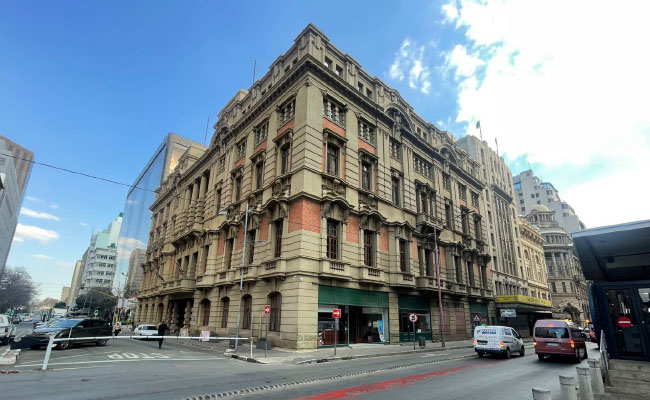Misery, they say, loves company. How else to explain the rather jovial mood at Marks Park on Saturday for the City of Joburg’s billing crisis blitz. Idle chatter about R15,000 overbilled here, R100,000 there; calls logged and closed without explanation; pre-termination notice upon pre-termination notice issued for grossly inflated accounts …
Me? After religiously paying probably-inflated estimate electricity costs for months on end, a bill two weeks back for -R14,000. Win! Then, a week ago, another – for R47,000. Followed 24 hours later by another – for R58,000.
Years of opening the municipal bill with the dread of someone stumbling across a Malusi Gigaba home video culminated in the inevitable: Joburg’s billing crisis had finally hit home.
Hence 3.5 hours spent in a parliament-sized marquee tent on the Marks Park rugby fields on the weekend. What a way to spend a Saturday morning. What a time to be alive.
What a scene.
Queues outside; queues for the registration/revenue table; queues for each of the city departments. Anxious ratepayers massaging their partners’ shoulders as they managed the family accounts; supervisors massaging their staffs’ shoulders as they managed anxious ratepayers. The broad smile of the invoicing guy, who had the enviable task of presenting ratepayers with the good news: reduced bills.
Completing the picture: numerous photos handed around of electricity meters with newspaper in the shot. See, City Power is singlehandedly keeping the news industry afloat. It’s taken a leaf from one too many hostage-drama blockbusters: for an accurate read on your meter, you need something showing the day’s date. Queue a big ka-ching for Business Day and The Star.
Old hat
Now, there’s nothing new to this billing crisis. It seems to extend at least as far back as 2010, when Joburg completed the R650m Project Phakama – a migration to an SAP system. If corporate tales of woe are anything to go by, SAP migration seems to be about as smooth and unproblematic as birthing a recalcitrant porcupine. Just ask Spar. But the idea was deemed necessary to move the city from legacy electricity, water and other utility services to an integrated platform for better service delivery.
The result was an unmitigated disaster: overinflated bills, inaccurate meter readings, illegal disconnections. The city bylaws don’t allow debt collection while an account is in dispute, but hey ho. Ultimately, it all led to a lack of actual service.
A few years later, the auditor-general could not verify nearly R870m from the sale of electricity and water as a result of estimated readings for an extended period of time. Sound familiar?
Hence the rollout of self-reporting smart meters, to obviate the need for meter readers and estimates. Almost a decade later, ratepayers are still subject to estimated – and inaccurate – readings.
By October last year, the courts found that the City of Joburg “has not the faintest idea of what is going on on the ground and that its accounting system seems to take cognisance of fictitious facts”, Moneyweb reported.
If there’s anything that’s indicative of Phakama’s failure, it’s that the city in July this year returned responsibility for billing to those champions of good service, City Power and Joburg Water. It also promised a stand-by-stand audit to verify the status of meters (unsuccessful, in my case), ensuring meters are properly linked to correct customer accounts (again, no dice) and “resetting our relationships with customers” (debatable, given the turnout at Marks Park).
Stockholm what?
Of course, the cynic would point to the fact that there’s a tight election coming next year, and the political powers-that-be are pushing the appeasement buttons with the aplomb of Neville Chamberlain as they attempt to bring irate ratepayers on side.
But in fairness, the city did pull out the stops on Saturday. As a most helpful revenue official told us, the whole point was to resolve the billing complaint backlog and actually fix incorrect bills – all on the same day. Officials were helpful and courteous – at least for the first 3.5 hours of the day, when I was a rat in the maze. It was an experience in how things can actually work in this city – and the country – with a bit of will, application and effort. A positive experience, even.
Which goes to show that Stockholm syndrome is alive and well – and now brought to the masses near you. See, when Joburg actually does something right, the city’s ratepayers are so grateful they almost forget the wringer the city has already put them through; the dysfunction they experience on a daily basis.
I can attest. After the magic that saw a R58,000 bill turn into just R41 owing … well, excuse me if I bastardise George Orwell: it was all all right, everything was all right, the struggle for a reasonable rates bill was finished … I loved the City of Joburg.
Top image: Rawpixel/Currency collage.
Sign up to Currency’s weekly newsletters to receive your own bulletin of weekday news and weekend treats. Register here.













